If you have not seen the film Hidden Figures, you have done yourself a great injustice. I laughed, I cried, I was inspired and I now know who Katherine G. Johnson, Dorothy Vaughan and Mary Jackson were. Intelligent, brave, unwavering Black American women whose contributions to the National Aeronautics and Space Administration (NASA) were monumental yet somehow completely overlooked and underappreciated within American history. I left the film knowing there must be trailblazing Black Canadian women who are also hidden figures within our country’s history.
Until recently, Viola Davis Desmond was one. By now, all Canadians should know her name and pretty soon, her face (as she is about to grace the $10 bill). But what about the other Black Canadian women whose contributions and accomplishments have been left out of our history books.
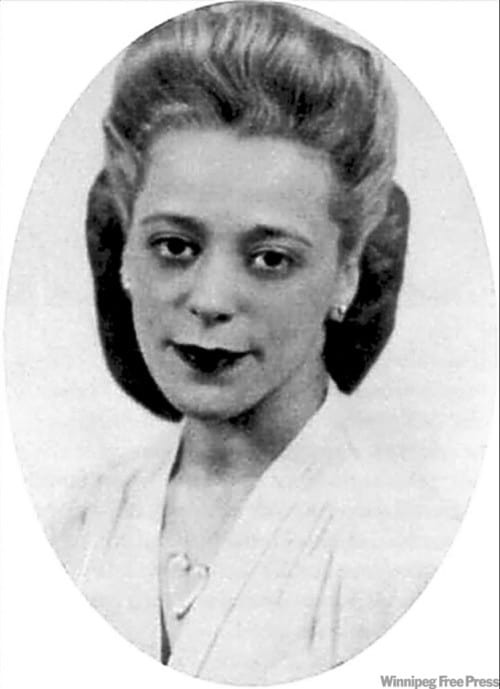
Viola Desmond (Effective Publishing Ltd.)
I sat down with the Mississauga Chapter of the Congress of Black Women of Canada to learn about their organization and also have its members shed light on Black Canadian women who should be remembered.
“Black women have demonstrated that in spite of the disadvantages – both racial and gender discrimination – and being marginalized as a minority population, we can overcome these challenges, succeed and even thrive,” said current Chapter President Ann-Jean Lennox.
First known as the Canadian Negro Women’s Association, The Congress of Black Women of Canada (CBWC) was founded originally by social activist and radio host Kay Livingstone in 1951. The group became a national organization and advocacy group in 1980 and in 2012, the Government of Canada posthumously declared Kay Livingstone as a Person of National Historic Significance.
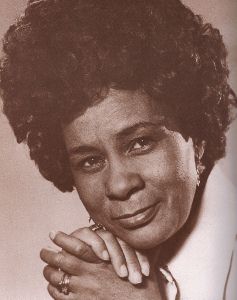
Kay Livingstone
Today, CBWC has eight chapters staffed with volunteer Black Canadian women work tirelessly to keep the organization visible through assisting Black women and their families in areas of Human Rights, Child Development, Education, Health, Housing, Pensions, Racism and Sexism.
“We are a community group but our membership is exclusively Black women, so we have to be vigilant to make sure that we are included in the discussions that impact the community,” said Loris Thomas, Regional Representative for all eight chapters as well as Education Coordinator for the Mississauga Chapter. “We have to be vigilant to make sure that we are at the table.”
The history of Black women in Canada is rich and it should be celebrated every day of the year. “Black History is history,” the group echoed.
Here are five pioneering Black Canadian women you should know about:
Marie Joseph Angelique, an enslaved Black women who lived during the 1700s in Montreal. In 1734, Marie was accused of starting a fire that destroyed forty-six buildings in the colony. It’s recorded that the fire began in Marie’s master’s home. She was arrested, tortured and hung for the crime – the evidence barely circumstantial. Her story symbolizes Black resistance and freedom.
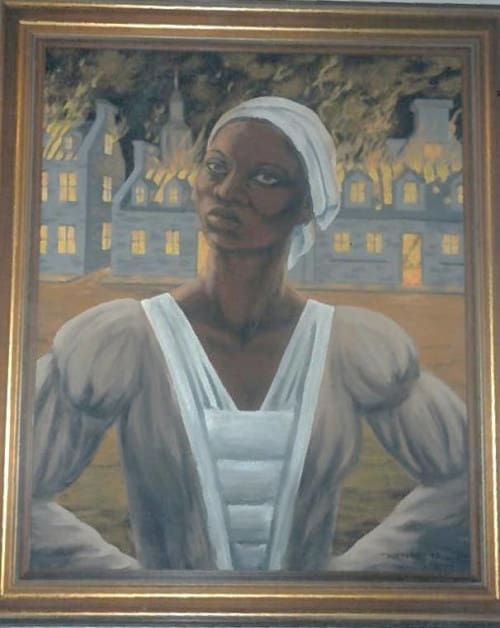
Marie Joseph Angelique
Chloe Cooley, whose early life has yet to be uncovered, fought for her freedom from enslavement in Canada. Her actions precipitated the Act To Limit Slavery in Upper Canada in 1793; the first legislation in the Britain colonies to restrict the salve trade. It’s recorded that Chloe refused to work and engaged in “truancy” (leaving her master’s property without permission for short periods of time and then returning).
Mary Ann Camberton Shadd Cary’s legacy began in the 19th century as the first Black female newspaper publisher in Canada. Mary Ann founded and edited The Provincial Freedom, which was first printed on March 24, 1853 and its motto read: “Self Reliance Is the True Road to Independence.” She arrived in this country via the Underground Railroad with other escaping American slaves. Once in Canada, Mary Ann established a racially integrated school for Black refugees in Windsor.
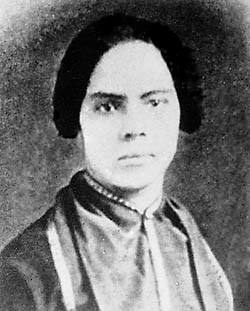
Mary Ann Camberton Shadd Cary
Portia White grew up in Halifax and lived in Africville, an African Canadian Village (now demolished). Portia made her singing debut in Toronto after she won a scholarship to the Halifax Conservatory of Music in 1939. She would become the first Black Canadian concert singer to receive international acclaim despite continually facing difficulties booking gigs due to her race. Her singing career spanned under a decade but she returned to the stage in 1964 to sing for Queen Elizabeth in Charlottetown, PEI.
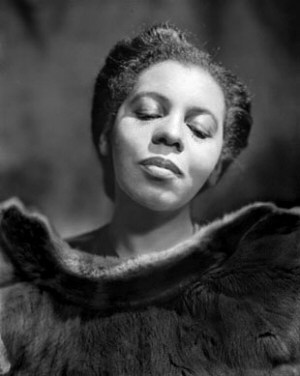
Portia White
Also in the 20th century, Rosemary Brown became the first Black female member of a provincial legislature and the first woman to run for leadership of a federal political party. In 1972, she won a seat in the Legislative Assembly of British Columbia as a New Democratic Party candidate and served in that position for fourteen years. She also ran as a candidate for the federal party’s leadership with the slogan “Brown is Beautiful.”
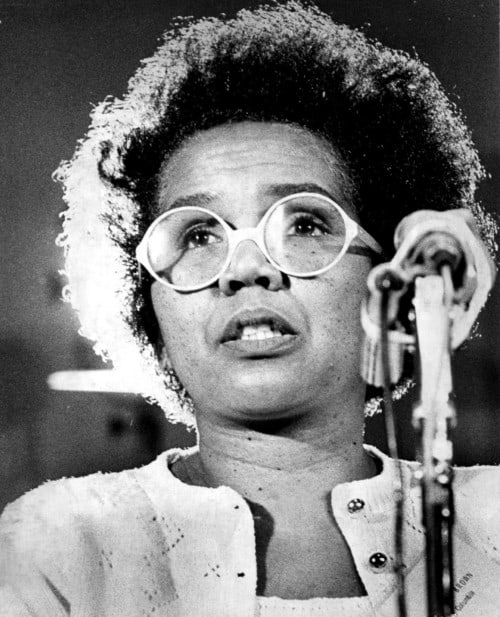
Rosemary Brown (PHOTO/John Goddard)
Black History Month is celebrated in this country because of the efforts of a Black woman named Jean Augustine. As the first Black Women elected to the House of Commons, she lobbied for February to be proclaimed as Black History Month. Jean was also a member of CBWC.
“The history of African Canadians represent human history and stories that all Canadians can be inspired by as they demonstrate the human ability to survive in spite of incredible odds.” said Lennox.
“We are learning more and more of a history that has been buried,” said Thomas.
It is clear that our history books are missing some key figures of helped shape this very nation. These women should be acknowledged, celebrated and most importantly, remembered. Below is a list of contemporary leaders that we can start to pay more attention to today.
Jennifer Hodge de Silva was the first Black filmmaker to work consistently with both the NFB and the CBC.
Dionne Brand, considered one of Canada’s most accomplished poetic voices, winner of the Governor General’s Award and the Griffin Poetry Prize and the Toronto’s poet laureate from 2009 – 2012.
Juanita Westmoreland-Traoré was appointed the first Black judge in the history of Quebec in 1999.
Lori Seale-Irving is the first Black female commissioned officer in the RCMP earning that promotion in 2007.
Trey Anthony is the first Black Canadian woman to have her own prime-time show, da Kink in my Hair, on a Canadian television network. The show ran from 2007 to 2009 on Global TV.
d’bi.young anitafrika, dub poet, playwright and actor, is a powerful Black voice in Canadian theatre right now. She is the recipient of the Canadian Poet of Honour Award, three-time Dora award winner, and featured as a Top Ten Poet of CNN. d’bi is also the Founder and Artistic Director of Canada’s Watah Theatre, supporting and developing the legacy of Black Theatre in Canada.
“Sisters, know that you are survivors, you are descended from a race of survivors,” said Lennox. “Know that the challenges that we face today are nothing compared to what our ancestors faced and survived so that we can be where we are today. Be proud of your history and draw strength from your ancestors.”
The Congress of Black Women of Canada is open to women 16 years of age or older. More information on their historic organization can be found here.
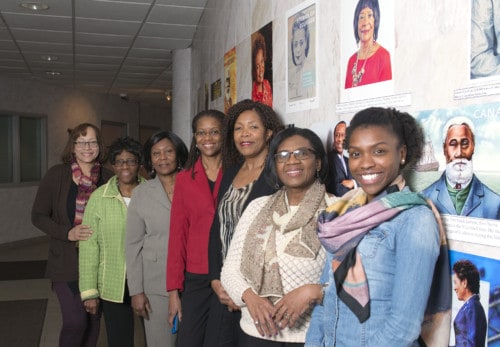
Mississauga Chapter of The Congress of Black Women of Canada (Left to Right): Greta Archer, Membership Coordinator Myrtle Gordon, Chair of Board of Directors and Non- Profit Housing Inc. Victoria Nelson, Chapter President Ann-Jean Lennox, Regional Representative and Education Coordinator Loris Thomas, Fundraising Coordinator Lynette Benjamin and newest member Chanel Parris, social and recreation coordinator. Photo by Solana Cain.



 Follow Us On Instagram
Follow Us On Instagram
